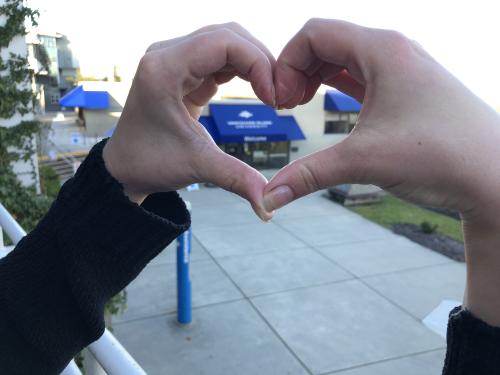Celebrating Indigenous mentorship at VIU
Vancouver Island University’s ‘su’luqw’a’ Community Cousins Aboriginal student mentorship program is celebrating its 10th anniversary in September 2021. In honour of this important milestone, we are sharing stories of people closely connected with the program every month leading up to the anniversary. Stay tuned for a celebration of this important milestone in February 2022 – when we hope to be able to gather in-person.
The ‘su’luqw’a’ Community Cousins program builds capacity for mentors to gain leadership and employability skills through outreach and mentoring activities. Students hone skills in self-awareness, communication, leadership, self-care and an exploration of personal values, with an emphasis on “telling one’s story” as a path to self-empowerment through outreach to others.
Attending Vancouver Island University was Ian Caplette’s last-ditch effort to save his own life.
Caplette, who was 31 at the time, came to VIU with a Grade 9 education, and a pattern of addiction, occasional homelessness and failed attempts at different careers in tourism, hospitality and the resource industry.
“I expected myself to fail because that had been my pattern up to that point,” he remembers. “At the same time, I considered the consequences of not being able to continue to be very severe because everything else I had tried up until that point had led to bad things. This was it for me.”
After spending a semester in the Adult Basic Education program, Caplette, whose mother is from Lax Kw’aalams Band near Prince Rupert and father is Anishinaabe/Mohawk, enrolled in the Bachelor of Arts program, majoring in what was then called First Nations Studies, where he began learning the history of colonialism in Canada, including the legacy of residential schools.
“I began learning about my own life and why it had been the way it was,” he says. “I realized my life had been affected by forces I previously didn’t know about. The first I’d ever heard about residential school was in post-secondary. That allowed me to situate myself in a way I hadn’t had the opportunity before. That first year was very eye opening for me.”
That first year, he also noticed that the dropout rate for Indigenous students was much higher than for the rest of the student population.

“People would just not come one day and then you just wouldn’t hear from them again,” remembers Caplette. “I was noticing because by my second semester, I was becoming more politically active and was elected Aboriginal students’ rep with the VIU Students’ Union. I became quite focused on doing something about it.”
The following year, Caplette took part in an outreach mentorship training program offered through the Faculty of Academic and Career Preparation that aimed to support new students in making connections on campus. After taking the training, he proposed creating a mentorship training cohort just for Indigenous students.
“I was involved in delivery and recruitment, so I picked on my friends at first,” he says. “We loosely affiliated around the idea of supporting other First Nations peoples coming to school at VIU. It was my contention that mentorship itself is very Indigenous and I was going to steal it back.”
Throughout university, Caplette struggled with imposter syndrome, feeling like his past history of drug addiction and bumpy employment meant he didn’t really deserve to be there. Every year – including his graduating year, during which he became VIU’s first Indigenous valedictorian, he remembers thinking, “Wow, I’m still here.”
Through the mentorship group, Caplette began to realize that he wasn’t alone with these thoughts – that many of his Indigenous peers were having similar struggles. Many of them opened up about their doubts around being able to finish and their anger at being the “token Indian” in the classroom; the shame of being called upon to answer a cultural question that they don’t know the answer to because they were disconnected from their culture.
“There was some serious soul work, spiritual work taking place, knowing that you weren’t alone,” says Caplette. “It gave me a sense of purpose that was beyond going to class. It’s very clear that the connections we made were part of the reason why some of us were able to continue on and go to classes. The ability for people to be mentored and supported while they go through cathartic processes in an environment that is frequently hostile to your identity and presence at an ambient racist level is nothing short of sacred.”
Caplette remembers one occasion when he skipped class to lock himself in his house and do drugs and drink. Students from the mentorship program came and knocked on his door, refusing to leave until he answered.
Caplette now works for the Nuu-Chah-Nulth Tribal Council as Director of Education, Training and Social Development – a role through which he continues to interact with VIU on a regular basis, as he administers funding for roughly 150 students attending programs ranging from certificates to PhDs, many of whom are studying at VIU.
“I have lots of pointed discussions about systemic barriers with various people in the VIU community,” he says.
Sylvia Scow, VIU’s Manager of Indigenous Protocol, says the mentorship group that Caplette formed paved the way for what would later become the Community Cousins.
“Having a continuing Indigenous mentorship program came from that first group that wanted to start their own and we were able to find some funds for the training,” she remembers. “They were doing some really great work. I knew that the group of students had formed a strong community for themselves and seemed to be encouraging each other.”
The year after Caplette graduated, Elder-in-Residence Gary Manson came to VIU to help form the ‘su’luqw’a’ Community Cousins. Here are Manson's reflections on the start of the Community Cousins program.

Special thanks to our supporters
The Community Cousins is generously supported by the RBC Foundation, The Peter Cundill Foundation and many other valued community donors and partners.
Related Posts
Got an article idea for the blog? Email students@viu.ca.



